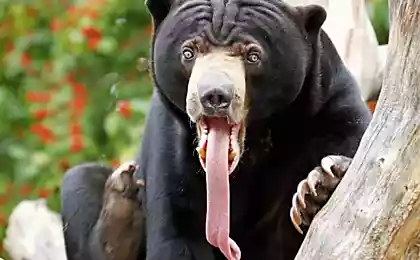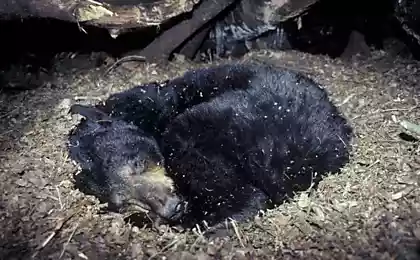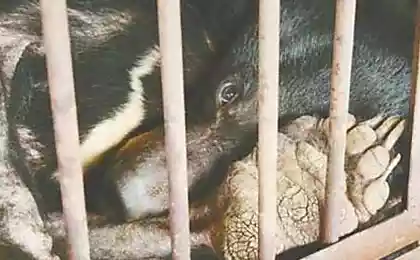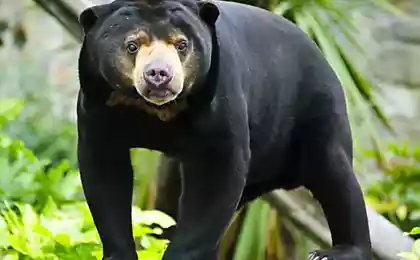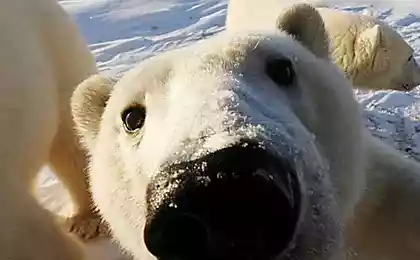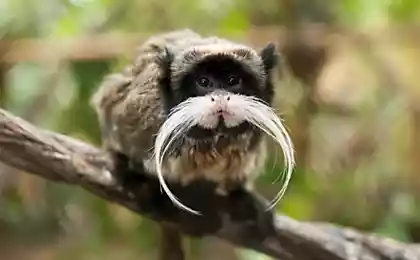1198
The smallest of the bears
Malay bear, the sun bear, honey bear or biruang - the smallest member of the bear family. Its growth is not more than 1, 5 m and a weight ranging from 25 to 65 kg. Despite the small size, biruang considered perhaps the most ferocious bear in the world. However, this opinion is very stereotypical, and there is an only in Western countries. In Asia, the Malay bear is not considered dangerous, more tame and keep it as a pet. Bears this species is relatively easy to train. Hazards to humans only mothers who protect their children and provoked angry individuals. It is known that in the battle for truth Malayan bear is fearless and fought hard, trying to win at any cost.
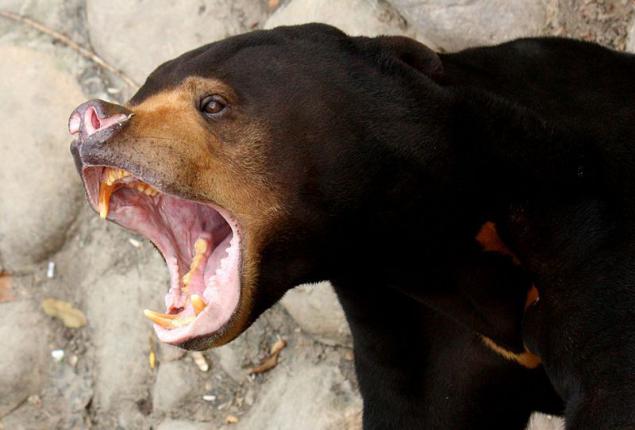
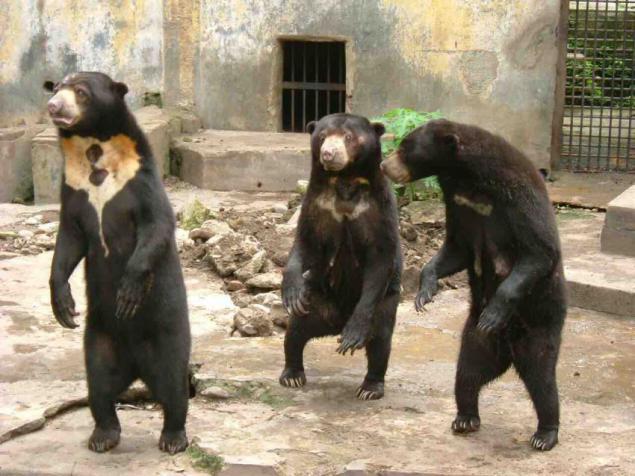
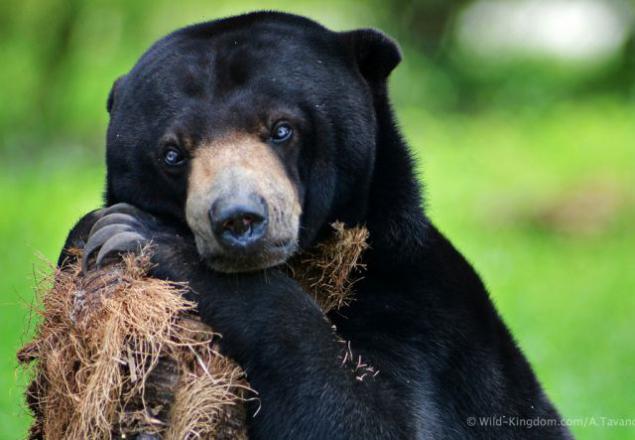
In Malay bears very large, sickle-shaped claws. They have large paws with naked soles, to help them successfully climb trees. From all bear species like most trees is biruang. Locals call them «basindo nan tenggil», which means "the one who likes to sit high." Being nocturnal, these bears can sleep all day or lie on the branches of trees. Here they build their nests and feed semblance leaves and fruits. By the way, Malayan bears do not hibernate.
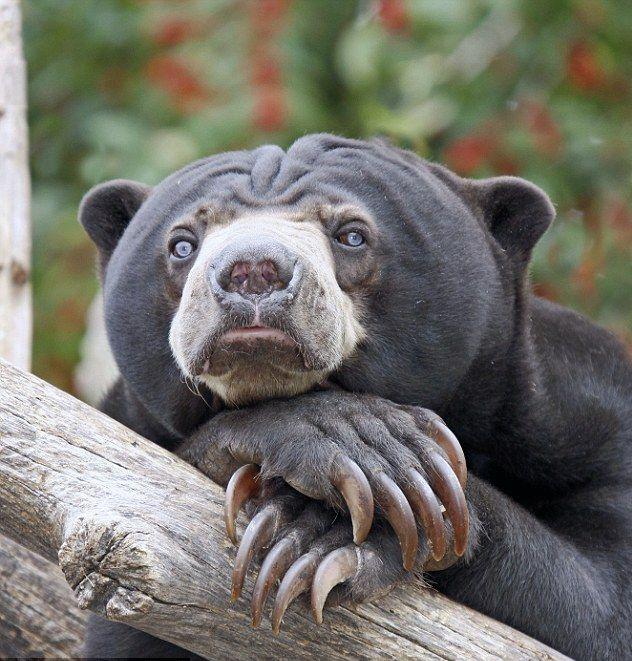
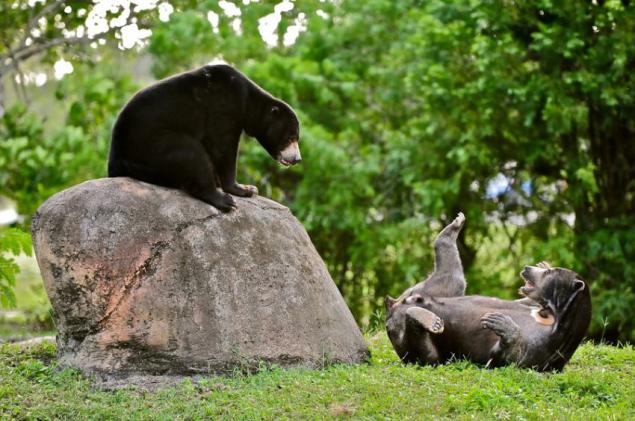
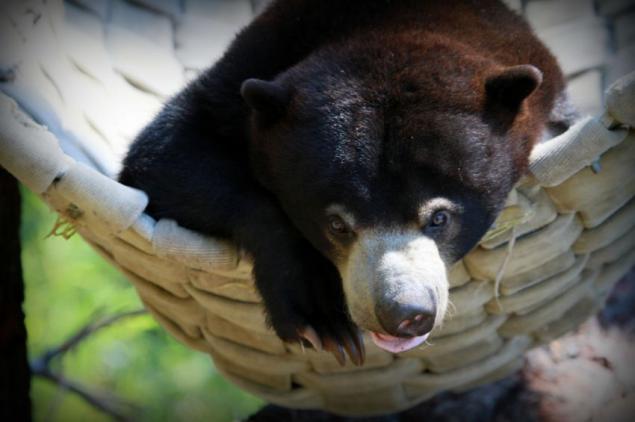
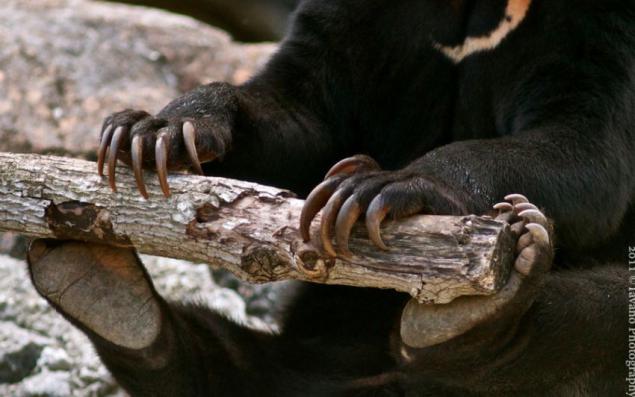
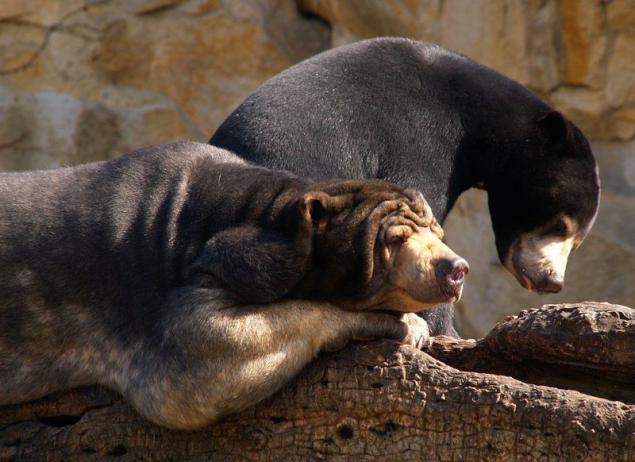
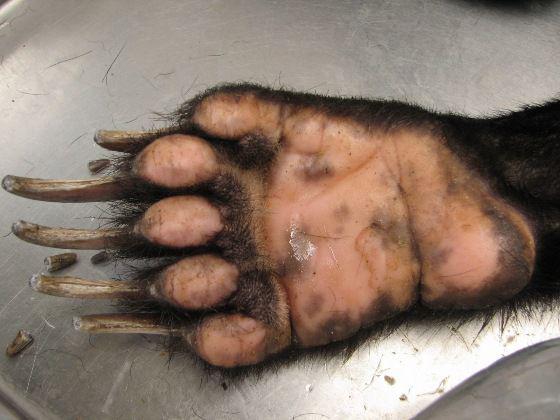
Malay bears are omnivores. They mainly eat insects, earthworms, shoots, fruits and roots of various plants. The unusually long (20-25 cm), thin and sticky tongue helps Malayan bear to extract honey from the hives. Hence one of his titles - "honey bear". By the way, when biruang case is not averse to eat not only honey, but also by the bees. Sometimes Malay bears also eat lizards, small mammals and birds. Powerful jaws enable them to easily crack the coconuts.
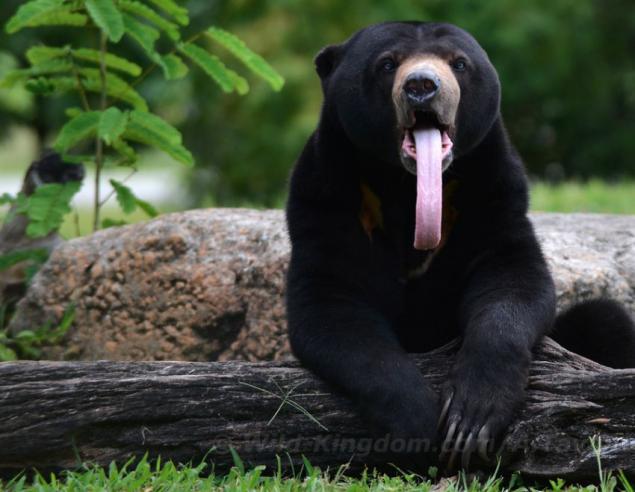
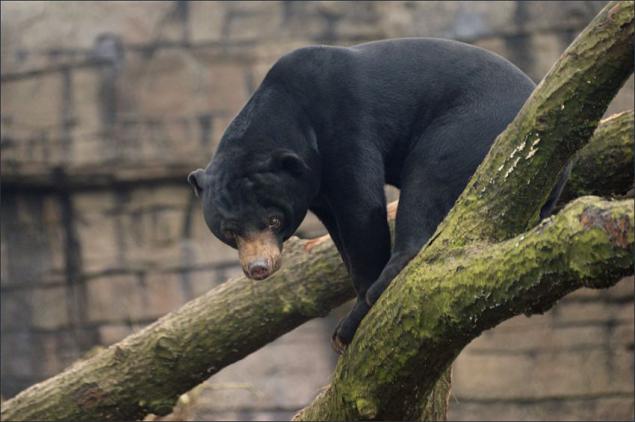
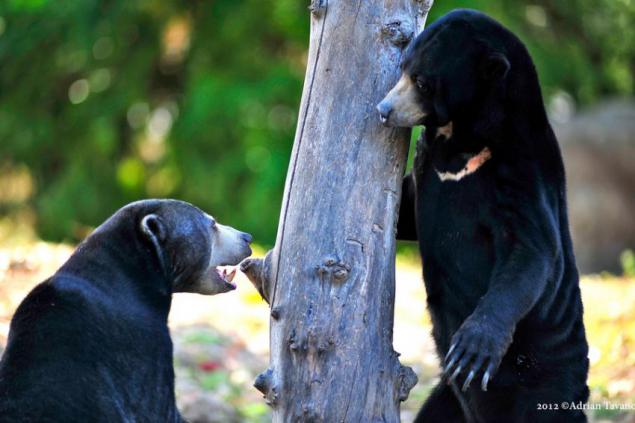
Malay Bears are common in the north-east India, southern China, Myanmar, Thailand, Indochina peninsula, the island of Borneo in Indonesia.
Unlike other bears have biruang short, hard and smooth fur. This is due to the warm climate, which is inhabited by Malay bears. Black, on the chest is usually a big bright spot in a horseshoe shape, resembling the rising sun. Hence the name of the genus - Helarctos (from the Greek. Hela - sun, arcto - bear), ie Solar Bear.
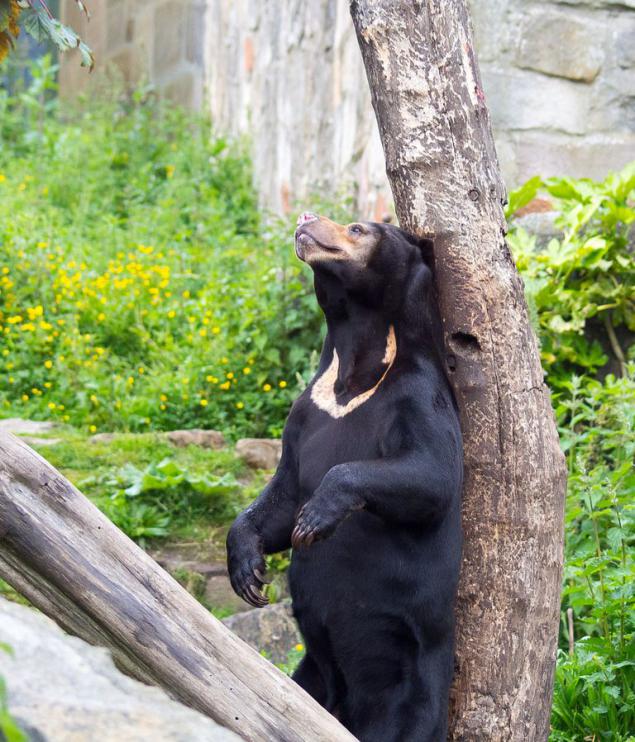
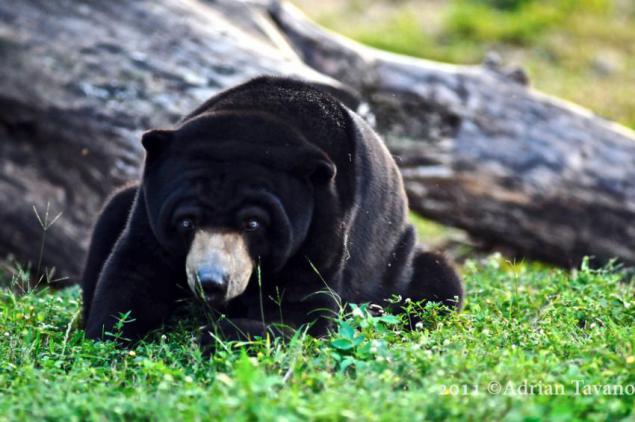
Life expectancy (in captivity) - up to 25 years. In the wild Malayan bears still quite poorly understood, but it is safe to say that in captivity they live much longer.
An interesting walk Malay Bear - all four paws are turned inward when walking. That's really really clumsy!
Vision Malay bears poor. This disadvantage is offset by excellent hearing and smell.
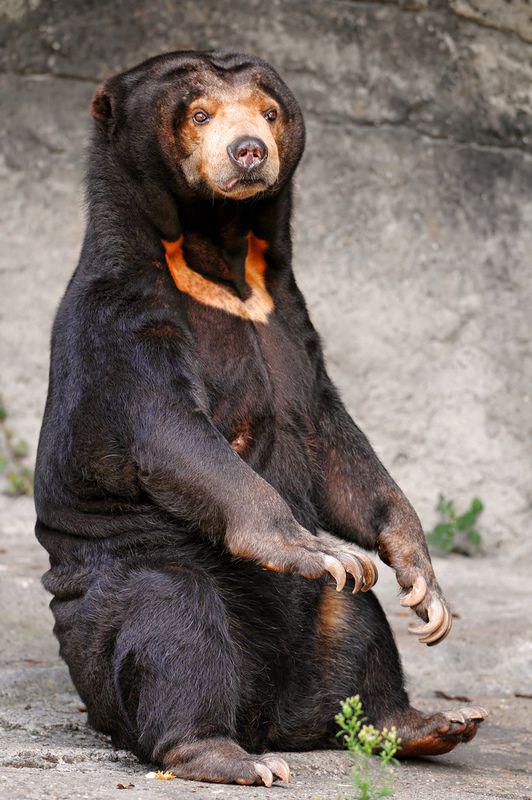
The main enemy of the Malay bear was and remains a man. As mentioned above, biruang extremely strong in combat, but because other predators try to avoid them. Sometimes there are clashes with the tigers and leopards. As is known, large predators often try to seize their prey by the throat. Thanks very loose skin on the neck, Malaysian bears can "slip" of the conditional teeth tiger or leopard and strike back.
People have caused great damage to the population of Malay bears. The Chinese have another 5 thousand. Years ago began to use bear bile in their traditional medicine for the treatment of serious bacterial infections. On the island of Borneo sew fur animal hats. Popular trophy hunting on the Malayan bear. Farmers shoot bears on the grounds that they could cause damage to their banana and coconut plantations. Currently, biruang are the bears and rare species listed in the International Red Book. It is known that every year the number of bears in the Malay world is reduced.
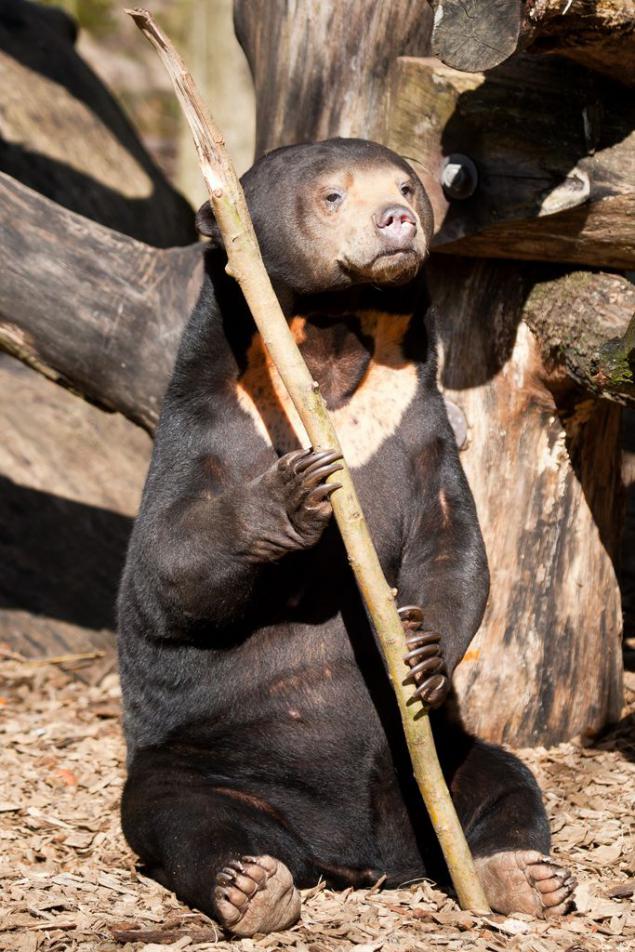
In general, Malay bears may be called timid and shy. Usually, they prefer not to show on the human eye and generally stay away from it as far as possible. In Asia, it can be found tamed Malay bears. Such biruang can safely walk around the house unattended and the owner keen to play with children. Malay bears very smart. There is a story about a bear who greatly surprised his hosts that did not eat rice given to him, but just scattered it on the ground and began to wait for something. Soon figure flocked birds that cunning biruang and dined.
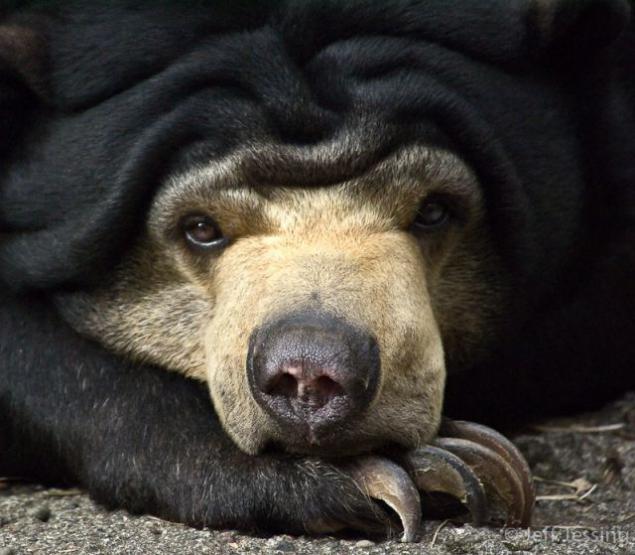
Source: lola1405.uol.ua



In Malay bears very large, sickle-shaped claws. They have large paws with naked soles, to help them successfully climb trees. From all bear species like most trees is biruang. Locals call them «basindo nan tenggil», which means "the one who likes to sit high." Being nocturnal, these bears can sleep all day or lie on the branches of trees. Here they build their nests and feed semblance leaves and fruits. By the way, Malayan bears do not hibernate.






Malay bears are omnivores. They mainly eat insects, earthworms, shoots, fruits and roots of various plants. The unusually long (20-25 cm), thin and sticky tongue helps Malayan bear to extract honey from the hives. Hence one of his titles - "honey bear". By the way, when biruang case is not averse to eat not only honey, but also by the bees. Sometimes Malay bears also eat lizards, small mammals and birds. Powerful jaws enable them to easily crack the coconuts.



Malay Bears are common in the north-east India, southern China, Myanmar, Thailand, Indochina peninsula, the island of Borneo in Indonesia.
Unlike other bears have biruang short, hard and smooth fur. This is due to the warm climate, which is inhabited by Malay bears. Black, on the chest is usually a big bright spot in a horseshoe shape, resembling the rising sun. Hence the name of the genus - Helarctos (from the Greek. Hela - sun, arcto - bear), ie Solar Bear.


Life expectancy (in captivity) - up to 25 years. In the wild Malayan bears still quite poorly understood, but it is safe to say that in captivity they live much longer.
An interesting walk Malay Bear - all four paws are turned inward when walking. That's really really clumsy!
Vision Malay bears poor. This disadvantage is offset by excellent hearing and smell.

The main enemy of the Malay bear was and remains a man. As mentioned above, biruang extremely strong in combat, but because other predators try to avoid them. Sometimes there are clashes with the tigers and leopards. As is known, large predators often try to seize their prey by the throat. Thanks very loose skin on the neck, Malaysian bears can "slip" of the conditional teeth tiger or leopard and strike back.
People have caused great damage to the population of Malay bears. The Chinese have another 5 thousand. Years ago began to use bear bile in their traditional medicine for the treatment of serious bacterial infections. On the island of Borneo sew fur animal hats. Popular trophy hunting on the Malayan bear. Farmers shoot bears on the grounds that they could cause damage to their banana and coconut plantations. Currently, biruang are the bears and rare species listed in the International Red Book. It is known that every year the number of bears in the Malay world is reduced.

In general, Malay bears may be called timid and shy. Usually, they prefer not to show on the human eye and generally stay away from it as far as possible. In Asia, it can be found tamed Malay bears. Such biruang can safely walk around the house unattended and the owner keen to play with children. Malay bears very smart. There is a story about a bear who greatly surprised his hosts that did not eat rice given to him, but just scattered it on the ground and began to wait for something. Soon figure flocked birds that cunning biruang and dined.

Source: lola1405.uol.ua

